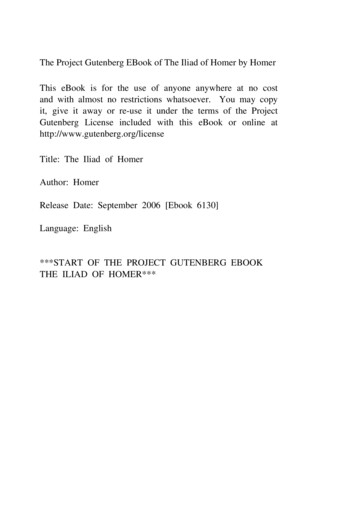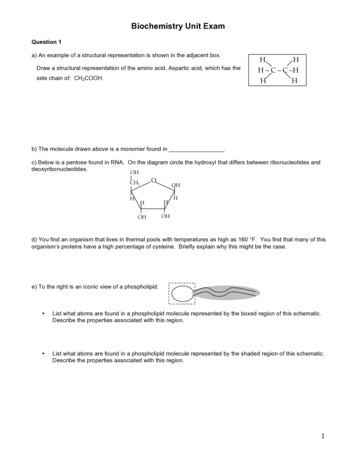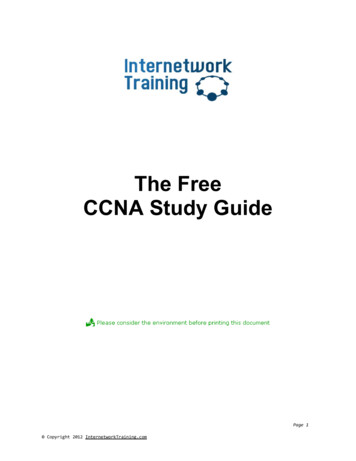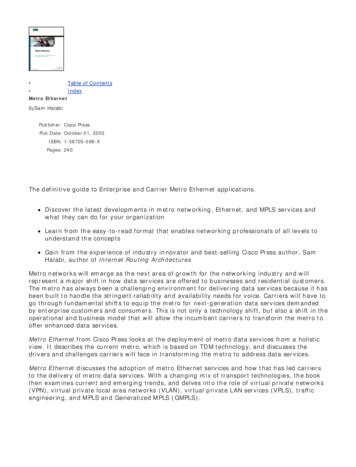
Transcription
The Project Gutenberg EBook of The Iliad of Homer by HomerThis eBook is for the use of anyone anywhere at no costand with almost no restrictions whatsoever. You may copyit, give it away or re-use it under the terms of the ProjectGutenberg License included with this eBook or online athttp://www.gutenberg.org/licenseTitle: The Iliad of HomerAuthor: HomerRelease Date: September 2006 [Ebook 6130]Language: English***START OF THE PROJECT GUTENBERG EBOOKTHE ILIAD OF HOMER***
The Iliad of HomerTranslated by Alexander Pope,with notes by theRev. Theodore Alois Buckley, M.A., F.S.A.andFlaxman's Designs.1899
ContentsINTRODUCTION. . . . . . . . . . . . . . . . .POPE'S PREFACE TO THE ILIAD OF HOMERBOOK I. . . . . . . . . . . . . . . . . . . . . . .BOOK II. . . . . . . . . . . . . . . . . . . . . .BOOK III. . . . . . . . . . . . . . . . . . . . . .BOOK IV. . . . . . . . . . . . . . . . . . . . . .BOOK V. . . . . . . . . . . . . . . . . . . . . .BOOK VI. . . . . . . . . . . . . . . . . . . . . .BOOK VII. . . . . . . . . . . . . . . . . . . . .BOOK VIII. . . . . . . . . . . . . . . . . . . . .BOOK IX. . . . . . . . . . . . . . . . . . . . . .BOOK X. . . . . . . . . . . . . . . . . . . . . .BOOK XI. . . . . . . . . . . . . . . . . . . . . .BOOK XII. . . . . . . . . . . . . . . . . . . . .BOOK XIII. . . . . . . . . . . . . . . . . . . . .BOOK XIV. . . . . . . . . . . . . . . . . . . . .BOOK XV. . . . . . . . . . . . . . . . . . . . .BOOK XVI. . . . . . . . . . . . . . . . . . . . .BOOK XVII. . . . . . . . . . . . . . . . . . . .BOOK XVIII. . . . . . . . . . . . . . . . . . . .BOOK XIX. . . . . . . . . . . . . . . . . . . . .BOOK XX. . . . . . . . . . . . . . . . . . . . .BOOK XXI. . . . . . . . . . . . . . . . . . . . .BOOK XXII. . . . . . . . . . . . . . . . . . . .BOOK XXIII. . . . . . . . . . . . . . . . . . . .BOOK XXIV. . . . . . . . . . . . . . . . . . . .CONCLUDING NOTE. . . . . . . . . . . . . 513545575593615641667707747
IllustrationsHOMER INVOKING THE MUSE. . . . . . . . . . . . .MARS. . . . . . . . . . . . . . . . . . . . . . . . . . . .MINERVA REPRESSING THE FURY OF ACHILLES. .THE DEPARTURE OF BRISEIS FROM THE TENT OFACHILLES. . . . . . . . . . . . . . . . . . . . . . . .THETIS CALLING BRIAREUS TO THE ASSISTANCEOF JUPITER. . . . . . . . . . . . . . . . . . . . . . .THETIS ENTREATING JUPITER TO HONOURACHILLES. . . . . . . . . . . . . . . . . . . . . . . .VULCAN. . . . . . . . . . . . . . . . . . . . . . . . . . .JUPITER. . . . . . . . . . . . . . . . . . . . . . . . . . .THE APOTHEOSIS OF HOMER. . . . . . . . . . . . . .JUPITER SENDING THE EVIL DREAM TOAGAMEMNON. . . . . . . . . . . . . . . . . . . . .NEPTUNE. . . . . . . . . . . . . . . . . . . . . . . . . .VENUS, DISGUISED, INVITING HELEN TO THECHAMBER OF PARIS. . . . . . . . . . . . . . . . . .VENUS PRESENTING HELEN TO PARIS. . . . . . . .VENUS. . . . . . . . . . . . . . . . . . . . . . . . . . . .Map, titled "Graeciae Antiquae". . . . . . . . . . . . . . .THE COUNCIL OF THE GODS. . . . . . . . . . . . . .Map of the Plain of Troy. . . . . . . . . . . . . . . . . . .VENUS, WOUNDED IN THE HAND, CONDUCTEDBY IRIS TO MARS. . . . . . . . . . . . . . . . . . .OTUS AND EPHIALTES HOLDING MARS CAPTIVE. .DIOMED CASTING HIS SPEAR AT MARS. . . . . . . .JUNO. . . . . . . . . . . . . . . . . . . . . . . . . . . . .HECTOR CHIDING PARIS. . . . . . . . . . . . . . . . .THE MEETING OF HECTOR AND ANDROMACHE. 78198201
viiiThe Iliad of HomerBOWS AND BOW CASE. . . . . . . . . . . . . . . . . . 207IRIS. . . . . . . . . . . . . . . . . . . . . . . . . . . . . . 208HECTOR AND AJAX SEPARATED BY THE HERALDS.221GREEK AMPHORA—WINE VESSELS. . . . . . . . . . 231JUNO AND MINERVA GOING TO ASSIST THEGREEKS. . . . . . . . . . . . . . . . . . . . . . . . . 251THE HOURS TAKING THE HORSES FROM JUNO'SCAR. . . . . . . . . . . . . . . . . . . . . . . . . . . . 253THE SHIELD OF ACHILLES. . . . . . . . . . . . . . . . 260PLUTO. . . . . . . . . . . . . . . . . . . . . . . . . . . . 270THE EMBASSY TO ACHILLES. . . . . . . . . . . . . . 271GREEK GALLEY. . . . . . . . . . . . . . . . . . . . . . 282PROSERPINE. . . . . . . . . . . . . . . . . . . . . . . . 283ACHILLES. . . . . . . . . . . . . . . . . . . . . . . . . . 294DIOMED AND ULYSSES RETURNING WITH THESPOILS OF RHESUS. . . . . . . . . . . . . . . . . . 316THE DESCENT OF DISCORD. . . . . . . . . . . . . . . 321HERCULES. . . . . . . . . . . . . . . . . . . . . . . . . 353POLYDAMAS ADVISING HECTOR. . . . . . . . . . . 359GREEK ALTAR. . . . . . . . . . . . . . . . . . . . . . . 375NEPTUNE RISING FROM THE SEA. . . . . . . . . . . 380GREEK EARRINGS. . . . . . . . . . . . . . . . . . . . . 413SLEEP ESCAPING FROM THE WRATH OF JUPITER. . 427GREEK SHIELD. . . . . . . . . . . . . . . . . . . . . . . 433BACCHUS. . . . . . . . . . . . . . . . . . . . . . . . . . 439AJAX DEFENDING THE GREEK SHIPS. . . . . . . . . 470CASTOR AND POLLUX. . . . . . . . . . . . . . . . . . 472Buckles. . . . . . . . . . . . . . . . . . . . . . . . . . . . 480DIANA. . . . . . . . . . . . . . . . . . . . . . . . . . . . 483SLEEP AND DEATH CONVEYING THE BODY OFSARPEDON TO LYCIA. . . . . . . . . . . . . . . . . 503ÆSCULAPIUS. . . . . . . . . . . . . . . . . . . . . . . . 512FIGHT FOR THE BODY OF PATROCLUS. . . . . . . . 525VULCAN FROM AN ANTIQUE GEM. . . . . . . . . . . 543
ixTHETIS ORDERING THE NEREIDS TO DESCENDINTO THE SEA. . . . . . . . . . . . . . . . . . . .JUNO COMMANDING THE SUN TO SET. . . . . . .TRIPOD. . . . . . . . . . . . . . . . . . . . . . . . . .THETIS AND EURYNOME RECEIVING THE INFANTVULCAN. . . . . . . . . . . . . . . . . . . . . . . .VULCAN AND CHARIS RECEIVING THETIS. . . . .THETIS BRINGING THE ARMOUR TO ACHILLES. .HERCULES. . . . . . . . . . . . . . . . . . . . . . . .THE GODS DESCENDING TO BATTLE. . . . . . . .CENTAUR. . . . . . . . . . . . . . . . . . . . . . . . .ACHILLES CONTENDING WITH THE RIVERS. . . .THE BATH. . . . . . . . . . . . . . . . . . . . . . . . .ANDROMACHE FAINTING ON THE WALL. . . . . .THE FUNERAL PILE OF PATROCLUS. . . . . . . . .CERES. . . . . . . . . . . . . . . . . . . . . . . . . . .HECTOR'S BODY AT THE CAR OF ACHILLES. . . .THE JUDGMENT OF PARIS. . . . . . . . . . . . . . .IRIS ADVISES PRIAM TO OBTAIN THE BODY OFHECTOR. . . . . . . . . . . . . . . . . . . . . . . .FUNERAL OF HECTOR. . . . . . . . . . . . . . . . . 552. 556. 561.562564577592597614628662663677705709710. 715. 744
[ix]INTRODUCTION.Scepticism is as much the result of knowledge, as knowledge isof scepticism. To be content with what we at present know, is,for the most part, to shut our ears against conviction; since, fromthe very gradual character of our education, we must continuallyforget, and emancipate ourselves from, knowledge previouslyacquired; we must set aside old notions and embrace fresh ones;and, as we learn, we must be daily unlearning something whichit has cost us no small labour and anxiety to acquire.And this difficulty attaches itself more closely to an age inwhich progress has gained a strong ascendency over prejudice,and in which persons and things are, day by day, finding theirreal level, in lieu of their conventional value. The same principleswhich have swept away traditional abuses, and which are makingrapid havoc among the revenues of sinecurists, and stripping thethin, tawdry veil from attractive superstitions, are working asactively in literature as in society. The credulity of one writer,or the partiality of another, finds as powerful a touchstone andas wholesome a chastisement in the healthy scepticism of atemperate class of antagonists, as the dreams of conservatism,or the impostures of pluralist sinecures in the Church. Historyand tradition, whether of ancient or comparatively recent times,are subjected to very different handling from that which theindulgence or credulity of former ages could allow. Merestatements are jealously watched, and the motives of the writerform as important an ingredient in the analysis of his history, asthe facts he records. Probability is a powerful and troublesome
xii[x]The Iliad of Homertest; and it is by this troublesome standard that a large portion ofhistorical evidence is sifted. Consistency is no less pertinaciousand exacting in its demands. In brief, to write a history, we mustknow more than mere facts. Human nature, viewed under aninduction of extended experience, is the best help to the criticismof human history. Historical characters can only be estimatedby the standard which human experience, whether actual ortraditionary, has furnished. To form correct views of individualswe must regard them as forming parts of a great whole—we mustmeasure them by their relation to the mass of beings by whomthey are surrounded, and, in contemplating the incidents in theirlives or condition which tradition has handed down to us, wemust rather consider the general bearing of the whole narrative,than the respective probability of its details.It is unfortunate for us, that, of some of the greatest men, weknow least, and talk most. Homer, Socrates, and Shakespere11"What," says Archdeacon Wilberforce, "is the natural root of loyalty asdistinguished from such mere selfish desire of personal security as is apt to takeits place in civilized times, but that consciousness of a natural bond among thefamilies of men which gives a fellow-feeling to whole clans and nations, andthus enlists their affections in behalf of those time-honoured representatives oftheir ancient blood, in whose success they feel a personal interest? Hence thedelight when we recognize an act of nobility or justice in our hereditary princes"'Tuque prior, tu parce genus qui ducis Olympo,Projice tela manu sanguis meus'"So strong is this feeling, that it regains an engrafted influence even whenhistory witnesses that vast convulsions have rent and weakened it and theCeltic feeling towards the Stuarts has been rekindled in our own days towardsthe grand daughter of George the Third of Hanover."Somewhat similar may be seen in the disposition to idolize those greatlawgivers of man's race, who have given expression, in the immortal languageof song, to the deeper inspirations of our nature. The thoughts of Homeror of Shakespere are the universal inheritance of the human race. In thismutual ground every man meets his brother, they have been bet forth by theprovidence of God to vindicate for all of us what nature could effect, andthat, in these representatives of our race, we might recognize our commonbenefactors.'—Doctrine of the Incarnation, pp. 9, 10.
INTRODUCTION.xiiihave, perhaps, contributed more to the intellectual enlightenmentof mankind than any other three writers who could be named,and yet the history of all three has given rise to a boundless oceanof discussion, which has left us little save the option of choosingwhich theory or theories we will follow. The personality ofShakespere is, perhaps, the only thing in which critics will allowus to believe without controversy; but upon everything else,even down to the authorship of plays, there is more or less ofdoubt and uncertainty. Of Socrates we know as little as thecontradictions of Plato and Xenophon will allow us to know. Hewas one of the dramatis personae in two dramas as unlike inprinciples as in style. He appears as the enunciator of opinionsas different in their tone as those of the writers who have handedthem down. When we have read Plato or Xenophon, we thinkwe know something of Socrates; when we have fairly read andexamined both, we feel convinced that we are something worsethan ignorant.It has been an easy, and a popular expedient, of late years, todeny the personal or real existence of men and things whose lifeand condition were too much for our belief. This system—whichhas often comforted the religious sceptic, and substituted theconsolations of Strauss for those of the New Testament—hasbeen of incalculable value to the historical theorists of the lastand present centuries. To question the existence of Alexanderthe Great, would be a more excusable act, than to believe inthat of Romulus. To deny a fact related in Herodotus, becauseit is inconsistent with a theory developed from an Assyrianinscription which no two scholars read in the same way, is morepardonable, than to believe in the good-natured old king whomthe elegant pen of Florian has idealized—Numa Pompilius.Scepticism has attained its culminating point with respectto Homer, and the state of our Homeric knowledge may bedescribed as a free permission to believe any theory, providedwe throw overboard all written tradition, concerning the author[xi]
xivThe Iliad of Homeror authors of the Iliad and Odyssey. What few authorities existon the subject, are summarily dismissed, although the argumentsappear to run in a circle. "This cannot be true, because it is nottrue; and, that is not true, because it cannot be true." Such seemsto be the style, in which testimony upon testimony, statementupon statement, is consigned to denial and oblivion.It is, however, unfortunate that the professed biographiesof Homer are partly forgeries, partly freaks of ingenuity andimagination, in which truth is the requisite most wanting. Beforetaking a brief review of the Homeric theory in its presentconditions, some notice must be taken of the treatise on the Lifeof Homer which has been attributed to Herodotus.According to this document, the city of Cumae in Æolia, was,at an early period, the seat of frequent immigrations from variousparts of Greece. Among the immigrants was Menapolus, the sonof Ithagenes. Although poor, he married, and the result of theunion was a girl named Critheis. The girl was left an orphan atan early age, under the guardianship of Cleanax, of Argos. Itis to the indiscretion of this maiden that we "are indebted forso much happiness." Homer was the first fruit of her juvenilefrailty, and received the name of Melesigenes, from having beenborn near the river Meles, in Boeotia, whither Critheis had beentransported in order to save her reputation."At this time," continues our narrative, "there lived at Smyrnaa man named Phemius, a teacher of literature and music, who,not being married, engaged Critheis to manage his household,and spin the flax he received as the price of his scholasticlabours. So satisfactory was her performance of this task, andso modest her conduct, that he made proposals of marriage,declaring himself, as a further inducement, willing to adopt herson, who, he asserted, would become a clever man, if he werecarefully brought up."They were married; careful cultivation ripened the talentswhich nature had bestowed, and Melesigenes soon surpassed
INTRODUCTION.xvhis schoolfellows in every attainment, and, when older, rivalledhis preceptor in wisdom. Phemius died, leaving him sole heirto his property, and his mother soon followed. Melesigenescarried on his adopted father's school with great success, excitingthe admiration not only of the inhabitants of Smyrna, but alsoof the strangers whom the trade carried on there, especially inthe exportation of corn, attracted to that city. Among thesevisitors, one Mentes, from Leucadia, the modern Santa Maura,who evinced a knowledge and intelligence rarely found in thosetimes, persuaded Melesigenes to close his school, and accompanyhim on his travels. He promised not only to pay his expenses, butto furnish him with a further stipend, urging, that, "While he wasyet young, it was fitting that he should see with his own eyes thecountries and cities which might hereafter be the subjects of hisdiscourses." Melesigenes consented, and set out with his patron,"examining all the curiosities of the countries they visited, andinforming himself of everything by interrogating those whom hemet." We may also suppose, that he wrote memoirs of all that hedeemed worthy of preservation2 Having set sail from Tyrrheniaand Iberia, they reached Ithaca. Here Melesigenes, who hadalready suffered in his eyes, became much worse, and Mentes,who was about to leave for Leucadia, left him to the medicalsuperintendence of a friend of his, named Mentor, the son ofAlcinor. Under his hospitable and intelligent host, Melesigenesrapidly became acquainted with the legends respecting Ulysses,which afterwards formed the subject of the Odyssey. Theinhabitants of Ithaca assert, that it was here that Melesigenesbecame blind, but the Colophomans make their city the seat of2Eikos de min aen kai mnaemoruna panton grapherthai. Vit. Hom. inSchweigh Herodot t. iv. p. 299, sq. Section 6. I may observe that thisLife has been paraphrased in English by my learned young friend KennethR. H. Mackenzie, and appended to my prose translation of the Odyssey. Thepresent abridgement however, will contain all that is of use to the reader, forthe biographical value of the treatise is most insignificant.[xii]
xviThe Iliad of Homerthat misfortune. He then returned to Smyrna, where he appliedhimself to the study of poetry.3But poverty soon drove him to Cumae. Having passed overthe Hermaean plain, he arrived at Neon Teichos, the New Wall,a colony of Cumae. Here his misfortunes and poetical talentgained him the friendship of one Tychias, an armourer. "And upto my time," continued the author, "the inhabitants showed theplace where he used to sit when giving a recitation of his verses,and they greatly honoured the spot. Here also a poplar grew,which they said had sprung up ever since Melesigenes arrived".4But poverty still drove him on, and he went by way of Larissa,as being the most convenient road. Here, the Cumans say,he composed an epitaph on Gordius, king of Phrygia, whichhas however, and with greater probability, been attributed to3—I.e. both of composing and reciting verses for as Blair observes, "Thefirst poets sang their own verses." Sextus Empir. adv. Mus. p. 360 ed. Fabric.Ou hamelei ge toi kai oi poiaetai melopoioi legontai, kai ta Omaerou epae topalai pros lyran aedeto."The voice," observes Heeren, "was always accompanied by someinstrument. The bard was provided with a harp on which he played aprelude, to elevate and inspire his mind, and with which he accompanied thesong when begun. His voice probably preserved a medium between singingand recitation; the words, and not the melody were regarded by the listeners,hence it was necessary for him to remain intelligible to all. In countries wherenothing similar is found, it is difficult to represent such scenes to the mind; butwhoever has had an opportunity of listening to the improvisation of Italy, caneasily form an idea of Demodocus and Phemius."—Ancient Greece, p. 94.4"Should it not be, since my arrival? asks Mackenzie, observing that "poplarscan hardly live so long". But setting aside the fact that we must not expectconsistency in a mere romance, the ancients had a superstitious belief in thegreat age of trees which grew near places consecrated by the presence of godsand great men. See Cicero de Legg II I, sub init., where he speaks of the planetree under which Socrates used to walk and of the tree at Delos, where Latonagave birth to Apollo. This passage is referred to by Stephanus of Byzantium, s.v. N. T. p. 490, ed. de Pinedo. I omit quoting any of the dull epigrams ascribed
INTRODUCTION.xviiCleobulus of Lindus.5Arrived at Cumae, he frequented the converzationes6 of the oldmen, and delighted all by the charms of his poetry. Encouragedby this favourable reception, he declared that, if they wouldallow him a public maintenance, he would render their city mostgloriously renowned. They avowed their willingness to supporthim in the measure he proposed, and procured him an audiencein the council. Having made the speech, with the purport ofwhich our author has forgotten to acquaint us, he retired, and leftthem to debate respecting the answer to be given to his proposal.The greater part of the assembly seemed favourable to thepoet's demand, but one man observed that "if they were to feedHomers, they would be encumbered with a multitude of uselesspeople." "From this circumstance," says the writer, "Melesigenesacquired the name of Homer, for the Cumans call blind menHomers."7 With a love of economy, which shows how similarthe world has always been in its treatment of literary men, thepension was denied, and the poet vented his disappointment in awish that Cumoea might never produce a poet capable of givingit renown and glory.At Phocoea, Homer was destined to experience another literarydistress. One Thestorides, who aimed at the reputation of poeticalgenius, kept Homer in his own house, and allowed him a pittance,on condition of the verses of the poet passing in his name. Havingto Homer for, as Mr. Justice Talfourd rightly observes, "The authenticity ofthese fragments depends upon that of the pseudo Herodotean Life of Homer,from which they are taken." Lit of Greece, pp. 38 in Encycl. Metrop. Cf.Coleridge, Classic Poets, p. 317.5It is quoted as the work of Cleobulus, by Diogenes Laert. Vit. Cleob. p. 62,ed. Casaub.6I trust I am justified in employing this as an equivalent for the Greek leschai.7Os ei tous, Homerous doxei trephein autois, omilon pollon te kai achreoinexousin. enteuthen de kai tounoma Homeros epekrataese to Melaesigenei apotaes symphoraes oi gar Kumaioi tous tuphlous Homerous legousin. Vit. Hom.l. c. p. 311. The etymology has been condemned by recent scholars. SeeWelcker, Epische Cyclus, p. 127, and Mackenzie's note, p. xiv.[xiii]
xviii[xiv]The Iliad of Homercollected sufficient poetry to be profitable, Thestorides, like somewould-be-literary publishers, neglected the man whose brains hehad sucked, and left him. At his departure, Homer is said tohave observed: "O Thestorides, of the many things hidden fromthe knowledge of man, nothing is more unintelligible than thehuman heart."8Homer continued his career of difficulty and distress, untilsome Chian merchants, struck by the similarity of the verses theyheard him recite, acquainted him with the fact that Thestorideswas pursuing a profitable livelihood by the recital of the verysame poems. This at once determined him to set out for Chios.No vessel happened then to be setting sail thither, but he foundone ready to Start for Erythrae, a town of Ionia, which facesthat island, and he prevailed upon the seamen to allow him toaccompany them. Having embarked, he invoked a favourablewind, and prayed that he might be able to expose the impostureof Thestorides, who, by his breach of hospitality, had drawndown the wrath of Jove the Hospitable.At Erythrae, Homer fortunately met with a person who hadknown him in Phocoea, by whose assistance he at length, aftersome difficulty, reached the little hamlet of Pithys. Here he metwith an adventure, which we will continue in the words of ourauthor. "Having set out from Pithys, Homer went on, attractedby the cries of some goats that were pasturing. The dogs barkedon his approach, and he cried out. Glaucus (for that was thename of the goat-herd) heard his voice, ran up quickly, called offhis dogs, and drove them away from Homer. For or some timehe stood wondering how a blind man should have reached sucha place alone, and what could be his design in coming. He then8Thestorides, thnetoisin anoiston poleon per, ouden aphrastoteron peletainoou anthropoisin. Ibid. p. 315. During his stay at Phocoea, Homer is said tohave composed the Little Iliad, and the Phocoeid. See Muller's Hist. of Lit., vi.Section 3. Welcker, l. c. pp. 132, 272, 358, sqq., and Mure, Gr. Lit. vol. ii. p.284, sq.
INTRODUCTION.xixwent up to him, and inquired who he was, and how he had cometo desolate places and untrodden spots, and of what he stoodin need. Homer, by recounting to him the whole history of hismisfortunes, moved him with compassion; and he took him, andled him to his cot, and having lit a fire, bade him sup.9"The dogs, instead of eating, kept barking at the stranger,according to their usual habit. Whereupon Homer addressedGlaucus thus: O Glaucus, my friend, prythee attend to mybehest. First give the dogs their supper at the doors of the hut: forso it is better, since, whilst they watch, nor thief nor wild beastwill approach the fold.Glaucus was pleased with the advice, and marvelled at itsauthor. Having finished supper, they banqueted10 afresh onconversation, Homer narrating his wanderings, and telling of thecities he had visited.At length they retired to rest; but on the following morning,Glaucus resolved to go to his master, and acquaint him withhis meeting with Homer. Having left the goats in charge ofa fellow-servant, he left Homer at home, promising to returnquickly. Having arrived at Bolissus, a place near the farm, andfinding his mate, he told him the whole story respecting Homerand his journey. He paid little attention to what he said, andblamed Glaucus for his stupidity in taking in and feeding maimedand enfeebled persons. However, he bade him bring the strangerto him.9This is so pretty a picture of early manners and hospitality, that it is almosta pity to find that it is obviously a copy from the Odyssey. See the fourteenthbook. In fact, whoever was the author of this fictitious biography, he showedsome tact in identifying Homer with certain events described in his poems, andin eliciting from them the germs of something like a personal narrative.10Dia logon estionto. A common metaphor. So Plato calls the partiesconversing daitumones, or estiatores. Tim. i. p. 522 A. Cf. Themist. Orat. vi.p. 168, and xvi. p. 374, ed. Petav So diaegaemasi sophois omou kai terpnoisaedio taen Thoinaen tois hestiomenois epoiei, Choricius in Fabric. Bibl. Gr. T.viii. P. 851. logois gar estia, Athenaeus vii p 275, A
xx[xv]The Iliad of HomerGlaucus told Homer what had taken place, and bade himfollow him, assuring him that good fortune would be the result.Conversation soon showed that the stranger was a man of muchcleverness and general knowledge, and the Chian persuaded himto remain, and to undertake the charge of his children.11Besides the satisfaction of driving the impostor Thestoridesfrom the island, Homer enjoyed considerable success as a teacher.In the town of Chios he established a school where he taught theprecepts of poetry. "To this day," says Chandler,12 "the mostcurious remain is that which has been named, without reason,the School of Homer. It is on the coast, at some distance fromthe city, northward, and appears to have been an open temple ofCybele, formed on the top of a rock. The shape is oval, and in thecentre is the image of the goddess, the head and an arm wanting.She is represented, as usual, sitting. The chair has a lion carvedon each side, and on the back. The area is bounded by a low rim,or seat, and about five yards over. The whole is hewn out of themountain, is rude, indistinct, and probably of the most remoteantiquity."So successful was this school, that Homer realised aconsiderable fortune. He married, and had two daughters, one ofwhom died single, the other married a Chian.The following passage betrays the same tendency to connectthe personages of the poems with the history of the poet, whichhas already been mentioned:—"In his poetical compositions Homer displays great gratitude11It was at Bolissus, and in the house of this Chian citizen, that Homer is saidto have written the Batrachomyomachia, or Battle of the Frogs and Mice, theEpicichlidia, and some other minor works.12Chandler, Travels, vol. i. p. 61, referred to in the Voyage Pittoresque dansla Grece, vol. i. P. 92, where a view of the spot is given of which the authorcandidly says,— "Je ne puis repondre d'une exactitude scrupuleuse dans lavue generale que j'en donne, car etant alle seul pour l'examiner je perdis moncrayon, et je fus oblige de m'en fier a ma memoire. Je ne crois cependant pasavoir trop a me plaindre d'elle en cette occasion."
INTRODUCTION.xxitowards Mentor of Ithaca, in the Odyssey, whose name he hasinserted in his poem as the companion of Ulysses,13 in returnfor the care taken of him when afflicted with blindness. Healso testifies his gratitude to Phemius, who had given him bothsustenance and instruction."His celebrity continued to increase, and many persons advisedhim to visit Greece, whither his reputation had now extended.Having, it is said, made some additions to his poems calculatedto please the vanity of the Athenians, of whose city he hadhitherto made no mention,14 he sent out for Samos. Here beingrecognized by a Samian, who had met with him in Chios, hewas handsomely received, and invited to join in celebrating theApaturian festival. He recited some verses, which gave greatsatisfaction, and by singing the Eiresione at the New Moonfestivals, he earned a subsistence, visiting the houses of the rich,with whose children he was very popular.In the spring he sailed for Athens, and arrived at the island ofIos, now Ino, where he fell extremely ill, and died. It is said thathis death arose from vexation, at not having been able to unravelan enigma proposed by some fishermen's children.15Such is, in brief, the substance of the earliest life of Homerwe possess, and so broad are the evidences of its historicalworthlessness, that it is scarcely necessary to point them outin detail. Let us now consider some of the opinions towhich a persevering, patient, and learned—but by no meansconsistent—series of investigations has led. In doing so, I professto bring forward statements, not to vouch for their reasonableness13A more probable reason for this companionship, and for the character ofMentor itself, is given by the allegorists, viz.: the assumption of Mentor's formby the guardian deity of the wise Ulysses, Minerva. The classical reader maycompare Plutarch, Opp. t. ii. p. 880; Xyland. Heraclid. Pont. Alleg. Hom. p.531-5, of Gale's Opusc. Mythol. Dionys. Halic. de Hom. Poes. c. 15; Apul. deDe
described as a free permission to believe any theory, provided we throw overboard all written tradition, concerning the author [xi] xiv The Iliad of Homer or authors of the Iliad and Odyssey. What few authorities exist on the











